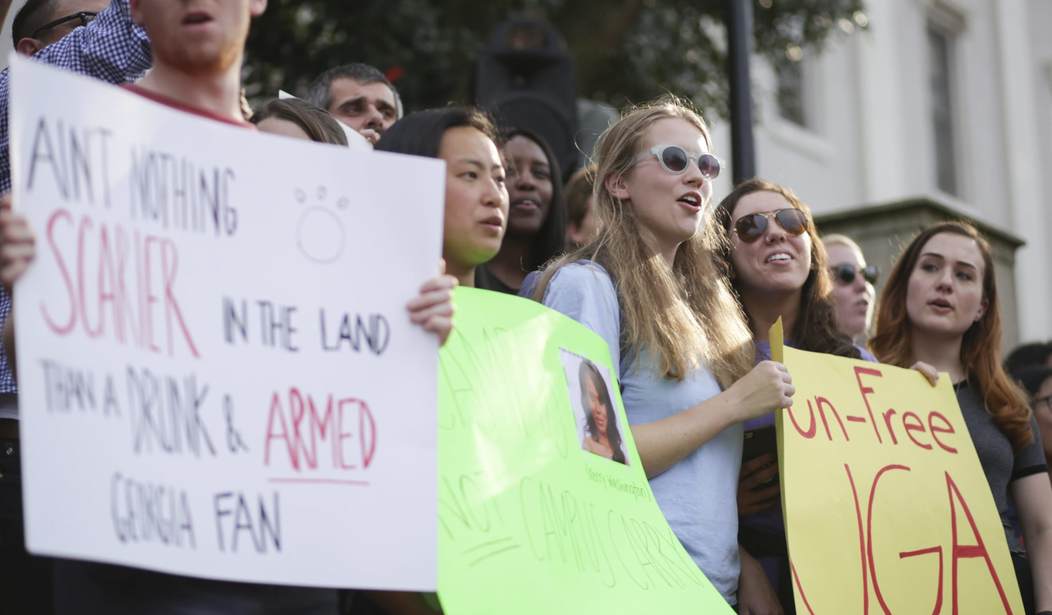Jonathan Golden, a senior at Georgia College in Milledgeville, Ga., isn’t sure if Gov. Nathan Deal should sign House Bill 280, so-called “campus carry” gun legislation.
Golden told the Rushville Republican the bill is “one of those things that’s not a bad idea, but it’s not a great idea.”
“There’s definitely people that, I think, could carry on campus and I would almost want them to. I have a friend who’s a combat medic and I know some military guys,” Golden said.
“But I think the fact that you don’t have to go through training to get a handgun, people like that who aren’t trained and aren’t responsible could be carrying on campus and should something happen [it] could make the situation worse,” Golden added.
However, another Georgia College student, Jake Hendon, is absolutely opposed to the bill.
“The judgment used by most college students probably isn’t the best, and so sometimes, especially in such tight quarters, emotions can run high sometimes,” Hendon said. “People can make impulsive decisions, and so I don’t think it’s best for a learning environment to have guns on campus.”
As Hendon and Golden will discover in the years ahead, this decision, like many that will impact their lives, is out of their hands.
It is up to Deal again. The ball is in his court after the Georgia Assembly, for the second year in a row, approved legislation to allow concealed weapons permit holders to carry guns on college and university campuses.
However, there is talk in Atlanta that the lack of a comma, along with the definition of a key phrase, could take the decision out of Deal’s hands, too.
Deal, a Republican, vetoed essentially the same legislation last year. As is always the case under the Georgia Constitution, the governor has 40 days to make up his mind. And the calendar pages are turning. The Assembly approved House Bill 280 on March 31.
Although Deal said at the time that “college campuses should be ‘gun-free zones,’” he also acknowledged the concerns of those who supported so-called “campus carry” legislation.
“They apparently believe that the colleges are not providing adequate security on their campuses and that civilian police are not doing so on the sidewalks, streets and parking lots students use as they go to and come from classes,” Deal said before vetoing HB 859 in 2016.
There are a few differences in House Bill 280, this year’s version of campus-carry, as compared to last year’s effort. And they could be enough to prompt Deal to scrawl his signature on this legislation.
This time, on-campus child-care centers have been added to the list of places where even CCW permit holders couldn’t carry guns, along with areas where high school students might be attending classes.
The Atlanta Journal-Constitution reported that change might be enough to prompt Deal to sign the legislation. The exception for areas where high school students might be on campus could have more of an impact that might be imagined by those who aren’t familiar with university life today.
Sen. Freddie Sims, a Democrat who voted against the campus-carry bill, said because many high school students will be on campus to attend career academies and dual enrollment classes, the legislation “may not be as far sweeping as first believed.”
Like students, university leadership in Georgia is nervous.
“Albany State University and the University System of Georgia believe the new exemptions improve the bill,” Albany State University said in a statement to the Albany Herald. “ASU and USG prefer current law, but USG is reviewing the legislation to see how it could be implemented at USG institutions.”
The AJC reported HB 280 authors also caved to another of Deal’s demands, one that could be a deal-maker or a deal-breaker for the final package.
It would keep CCW guns out of “faculty, staff, or administrative offices or rooms where disciplinary proceedings are conducted.”
But Democratic aide Stefan Turkheimer believes there is a problem with the punctuation in that sentence, a problem serious enough that it might scuttle House Bill 280.
Turkheimer pointed out the people who actually wrote the bill missed a comma that should go before the word “offices.” That could be a mistake that scuttles the intent of the legislation.
“Without that comma, it’s just two clauses both modifying ‘offices or rooms.’ This reading becomes even more persuasive when you consider that both of these area exceptions, if they were meant to be separate, could, and perhaps should, have been put into different clauses,” Turkheimer wrote.
“That’s how ‘Move on When Ready’ and career academies were handled in the same bill,” Turkheimer added. “So unless faculty offices are also rooms where ‘disciplinary hearings are conducted,’ they would NOT be exempted.”
Turkheimer also foresees a problem with the definition of the phrase “grievance procedures,” which are used to handle complaints of sexual assault and similar campus problems outside of the normal disciplinary hearing environment, and the “rooms” where these sessions might be held.
“So would the rooms where a rapist confronts his victim not be off-limits,” Turkheimer wondered, “such that he can be wearing a gun while he does it?”









Join the conversation as a VIP Member